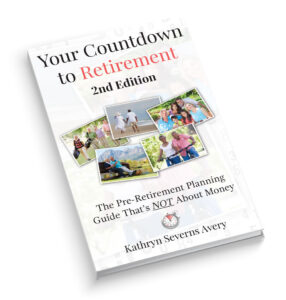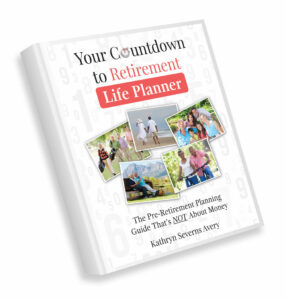It's Not Just About the Money!
Give Me More Time Off and I’ll Work Forever
-
Author : Your Countdown to Retirement
Date : July 29, 2019
Category : Lifestyle, Redefining Retirement, Retirement Planning
Comments : 0
Like : 0

By Kathryn Severns Avery
I love working. The joy of being productive, earning money, increasing knowledge and experience, and social contact are just a few of the reasons why I work. In just a few short years I will reach the traditional retirement age of 65. I find myself asking “Why would I want to stop working then?” The answer is easy — I don’t.
The idea of not contributing my skills, talent, energy, and experience in the workplace is incomprehensible to me. Yet, I am all too aware that my physical limitations are increasing and my energy and stamina are decreasing. I have long been accustomed to being an energizer bunny – capable of working tirelessly to accomplish a task. Now, my energy levels are changing but I am lightyears away from wanting to put my feet up and embrace the lifestyle we call retirement.
I would like to continue to work for as long as possible. Not because I have to but because I want to. There are things I want more of like vacation days, flexibility with my work schedule, permission to rest during the day when I become fatigued, and the ability to pursue new interests. As someone who is self-employed, I have the ability to make those changes. But what options are there for someone who is not self-employed? Perhaps more than you might imagine.
A 2015 study from the Life Insurance Management Research Association found that 92 percent of employers are taking specific action to help older workers stay on the job. The study also said “two-thirds of employers in the study offer flexible hours while 42 percent offer flexibility on where employees work such as, working from home or other locations. Other adjustments include job training/re-skilling and job sharing.”
The reasons for companies accommodating older workers include the business benefits of a mature workforce and the desire of 80% of employers to retain experience, institutional knowledge, and leadership. As more and more baby boomers leave the workforce and retire, employers that understand their contribution to the bottom line may provide incentives such as increased vacation, and flexible work hours to get them to stay working longer.
The current version of retirement, 20 or more years of leisure after working, has never existed in our country before and perhaps for good reason. Working is a fundamental part of living. With a few tweaks by employers, baby boomers may have the option to work as much or as little as they want for as long as they want.
If you are ready to start the conversation about retirement or continuing to work past retirement age, contact us or visit our Life Planning Center in Littleton, CO.
Subscribe to YCTR!
Latest Blog Posts




